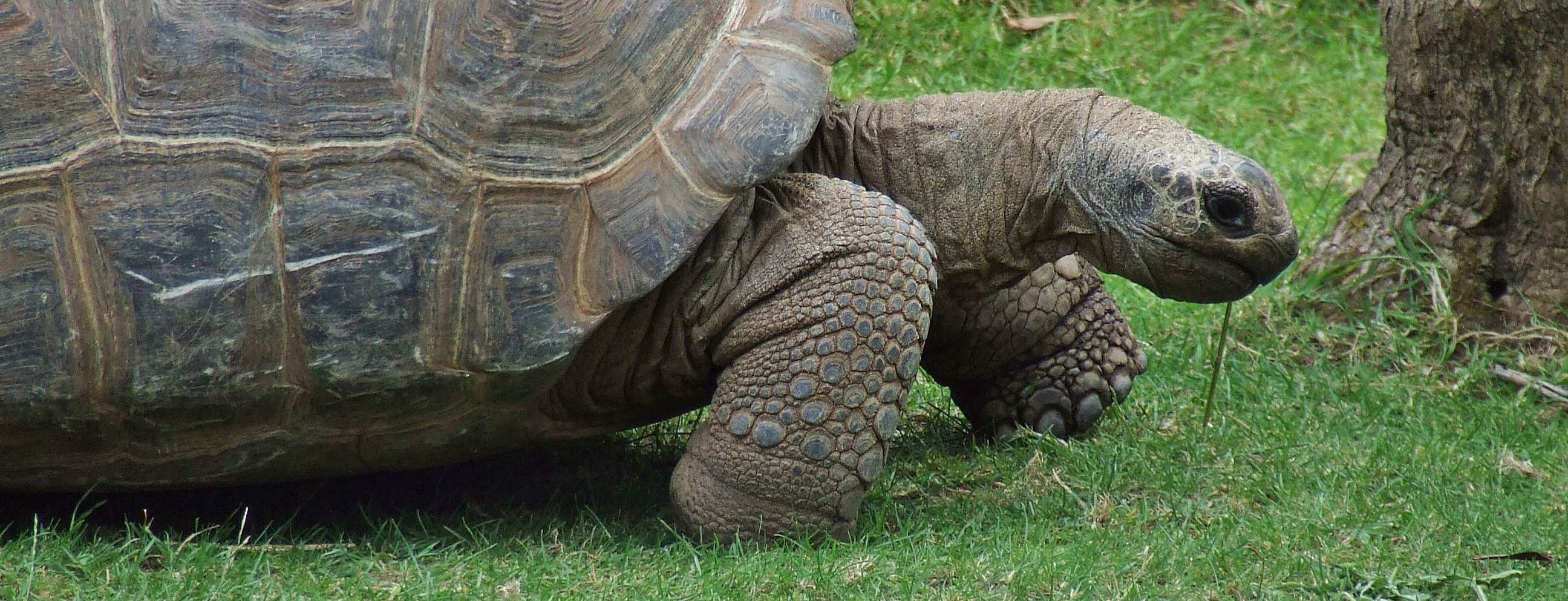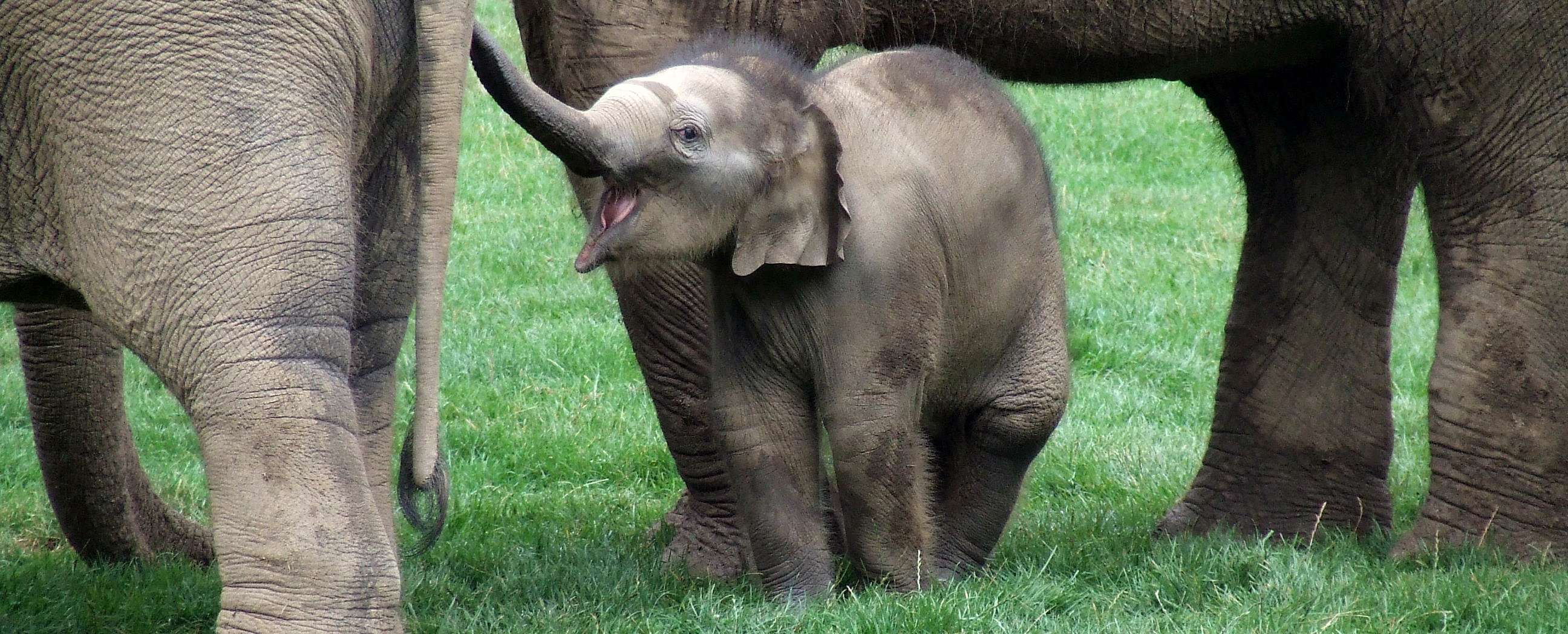Európa állatkertjei
ZOOlogical Gardens of EuROPE
MIXED-SPECIES EXHIBITS WITH CARNIVORANS IV.
Mixed-species exhibits with Civets and Genets (Viverridae)
Written by KRISZTIÁN SVÁBIK
Assistant Curator, Budapest Zoo and Botanical Garden, Hungary
Uploaded: 28th June 2018
Refreshed: 25th May 2020
INTRODUCTION
Within the narrower meaning of the mixed-species exhibits this document deals nine species of Civets and Genets.
In the list below you can see which species have been kept in mixed exhibits in captivity:
Civets and Genets, Viverridae
Binturong, Arctictis binturong Raffles, 1821
Small-toothed Palm Civet, Arctogalidia trivirgata Gray, 1832
Common Palm Civet, Paradoxurus hermaphroditus Pallas, 1777
Masked Palm Civet, Paguma larvata C. E. H. Smith, 1827
Owston’s Palm Civet, Chrotogale owstoni Thomas, 1912
Malay Civet, Viverra tangalunga Gray, 1832
Common Genet, Genetta genetta Linnaeus, 1758
Cape Genet, Genetta tigrina Schreber, 1776
Central African Large-spotted Genet, Genetta maculata Gray, 1830
 Viverrids with viverrids
Viverrids with viverrids
The lists below show many combinations with different viverrid species have been kept together in many institutions. It should be noted shortly that in Tierpark Gotha several Genet hybrids were born from the following combinations: Genetta genetta x Genetta maculata; Genetta maculata x Genetta tigrina
LIST OF SPECIES COMBINATIONS - VIVERRIDAE
The list shows examples of species combinations with at least one civet or genet species combined with the taxa below
Binturong, Arctictis binturong (Photo © Krisztián Svábik)
Lion-tailed Macaque, Macaca silenus
Silvery Lutung, Trachypithecus cristatus
Francois’s Langur, Trachypithecus francoisi
Dusky Langur, Trachypithecus obscurus
Sumatran Orangutan, Pongo abelii
Malayan Porcupine, Hystrix brachyura
Asiatic Brush-tailed Porcupine, Atherurus macrourus
Giant Squirrel, Ratufa sp.
Prevost’s Squirrel, Callosciurus prevostii
Rodrigues Fruit Bat, Pteropus rodricensis
Common Palm Civet, Paradoxurus hermaphroditus
Masked Palm Civet, Paguma larvata
Leopard Cat, Prionailurus bengalensis
Dhole, Cuon alpinus
Sun Bear, Helarctos malayanus
Asian Small-clawed Otter, Aonyx cinereus
Smooth-coated Otter, Lutrogale perspicillata
Greater Hog Badger, Arctonyx collaris
Malay Tapir, Tapirus indicus
Tufted Deer, Elaphodus cephalophus
Indian Muntjac, Muntiacus muntjak
Reeves’ Muntjac, Muntiacus reevesi
Blue Sheep, Pseudois nayaur
Great White Pelican, Pelecanus onocrotalus
Great Cormorant, Phalacrocorax carbo
Little Pied Cormorant, Microcarbo melanoleucos
Fulvous Whistling-duck, Dendrocygna bicolor
White-faced Whistling-duck, Dendrocygna viduata
Radjah Shelduck, Tadorna radjah
Magpie Goose, Anseranas semipalmata
Meller’s Duck, Anas melleri
Common Water Monitor, Varanus salvator
Asian butterflies
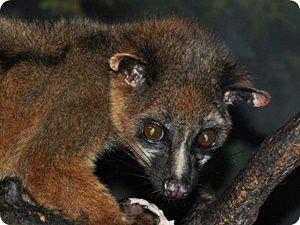 Small-toothed Palm Civet, Arctogalidia trivirgata (Photo © Jonas Livet)
Small-toothed Palm Civet, Arctogalidia trivirgata (Photo © Jonas Livet)
Common Palm Civet, Paradoxurus hermaphroditus
Malay Civet, Viverra tangalunga
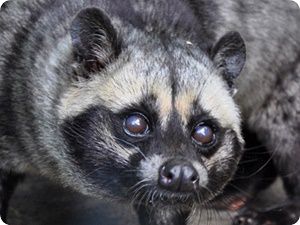 Common Palm Civet, Paradoxurus hermaphroditus (Photo © Jonas Livet)
Common Palm Civet, Paradoxurus hermaphroditus (Photo © Jonas Livet)
Malayan Porcupine, Hystrix brachyura
Asiatic Brush-tailed Porcupine, Atherurus macrourus
Binturong, Arctictis binturong
Small-toothed Palm Civet, Arctogalidia trivirgata
Leopard Cat, Prionailurus bengalensis
Large-toothed Ferret Badger, Melogale personata
Indian Muntjac, Muntiacus muntjak
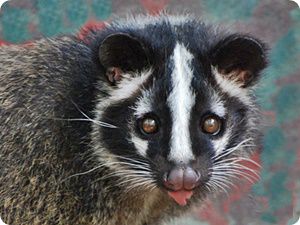 Masked Palm Civet, Paguma larvata (Photo © Jonas Livet)
Masked Palm Civet, Paguma larvata (Photo © Jonas Livet)
Malayan Porcupine, Hystrix brachyura
Binturong, Arctictis binturong
Asiatic Black Bear, Ursus thibetanus
Northern Raccoon, Procyon lotor
Skunks, Mephitidae
Greater Hog Badger, Arctonyx collaris
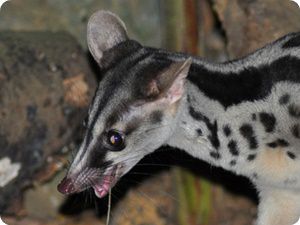 Owston’s Palm Civet, Chrotogale owstoni (Photo © Jonas Livet)
Owston’s Palm Civet, Chrotogale owstoni (Photo © Jonas Livet)
Northern Treeshrew, Tupaia belangeri
Prevost’s Squirrel, Callosciurus prevostii
Tortoise
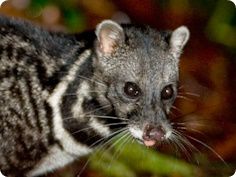 Malayan Civet, Viverra tangalunga (Photo © Kalyan Varma)
Malayan Civet, Viverra tangalunga (Photo © Kalyan Varma)
White-handed Gibbon, Hylobates lar
Small-toothed Palm Civet, Arctogalidia trivirgata
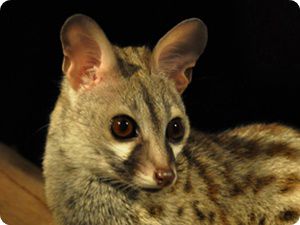 Common Genet, Genetta genetta (Photo © Jonas Livet)
Common Genet, Genetta genetta (Photo © Jonas Livet)
Western Lowland Gorilla, Gorilla gorilla gorilla
Central African Large-spotted Genet, Genetta maculata
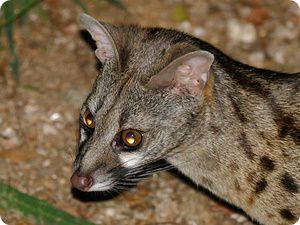 Cape Genet, Genetta tigrina (Photo © Bernard Dupont)
Cape Genet, Genetta tigrina (Photo © Bernard Dupont)
African Brush-tailed Porcupine, Atherurus africanus
Central African Large-spotted Genet, Genetta maculata
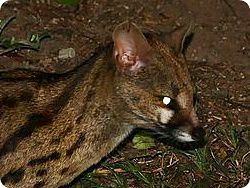 Central African Large-spotted Genet, Genetta maculata (Photo © Bernard Dupont)
Central African Large-spotted Genet, Genetta maculata (Photo © Bernard Dupont)
Common Genet, Genetta genetta
Cape Genet, Genetta tigrina
LIST OF MIXED-SPECIES EXHIBITS WITH LOCATIONS - VIVERRIDAE
The list shows specific examples of mixed-species exhibits involving at least one civet or genet species combined with the taxa below, with indication of the institution(s) where they have been tried out
Binturong, Arctictis binturong
Combined species:
- Binturong, Arctictis binturong
- Lion-tailed Macaque, Macaca silenus
Institution(s): San Diego Zoo (California, United States of America)
Combined species:
- Binturong, Arctictis binturong
- Dusky Langur, Trachypithecus obscurus
- Prevost’s Squirrel, Callosciurus prevostii
- Reeves’ Muntjac, Muntiacus reevesi
unknown institution
Combined species:
- Binturong, Arctictis binturong
- Silvery Lutung, Trachypithecus cristatus
- Asian Small-clawed Otter, Aonyx cinereus
Institution(s): Colchester Zoo (United Kingdom)
Combined species:
- Binturong, Arctictis binturong
- Francois’s Langur, Trachypithecus francoisi
- Asian Small-clawed Otter, Aonyx cinereus
Institution(s): Colchester Zoo (United Kingdom)
Combined species:
- Binturong, Arctictis binturong
- Sumatran Orangutan, Pongo abelii
Institution(s): Zoo Frankfurt (Germany)
Combined species:
- Binturong, Arctictis binturong
- Giant Squirrel, Ratufa sp.
unknown institution
Combined species:
- Binturong, Arctictis binturong
- Prevost’s Squirrel, Callosciurus prevostii
Institution(s): Brookfield Zoo (Illinois, United States of America), Staten Island Zoo (New York, United States of America)
Combined species:
- Binturong, Arctictis binturong
- Malayan Porcupine, Hystrix brachyura
Institution(s): Saigon Zoo and Botanical Gardens (Ho Chi Minh City, Vietnam)
Combined species:
- Binturong, Arctictis binturong
- Rodrigues Fruit Bat, Pteropus rodricensis
unknown institution
Combined species:
- Binturong, Arctictis binturong
- Common Palm Civet, Paradoxurus hermaphroditus
- Leopard Cat, Prionailurus bengalensis
- Malayan Porcupine, Hystrix brachyura
- Asiatic Brush-tailed Porcupine, Atherurus macrourus
- Indian Muntjac, Muntiacus muntjak
Institution(s): Zoo Taiping & Night Safari (Malaysia)
Combined species:
- Binturong, Arctictis binturong
- Common Palm Civet, Paradoxurus hermaphroditus
- Asian Small-clawed Otter, Aonyx cinereus
Institution(s): Wild Zoological Park (Bobbington, United Kingdom)
Combined species:
- Binturong, Arctictis binturong
- Masked Palm Civet, Paguma larvata
- Greater Hog Badger, Arctonyx collaris
Institution(s): Shanghai Zoo (China)
Combined species:
- Binturong, Arctictis binturong
- Dhole, Cuon alpinus
Institution(s): Zoo Taiping & Night Safari (Malaysia)
Combined species:
- Binturong, Arctictis binturong
- Sun Bear, Helarctos malayanus
Institution(s): Espace Zoologique Saint-Martin la Plaine (France), Koninklijke Burgers' Zoo (Arnhem, the Netherlands), Chester Zoo (United Kingdom)
Binturong (Arctictis binturong) and Sun Bear (Helarctos malayanus)
Espace Espace Zoologique de Saint-Martin-la-Plaine, France
Photo © Espace Zoologique de Saint-Martin-la-Plaine
Binturong (Arctictis binturong) and Sun Bear (Helarctos malayanus) mixed exhibit
Koninklijke Burgers’ Zoo, Arnhem, the Netherlands
Photo © Krisztián Svábik
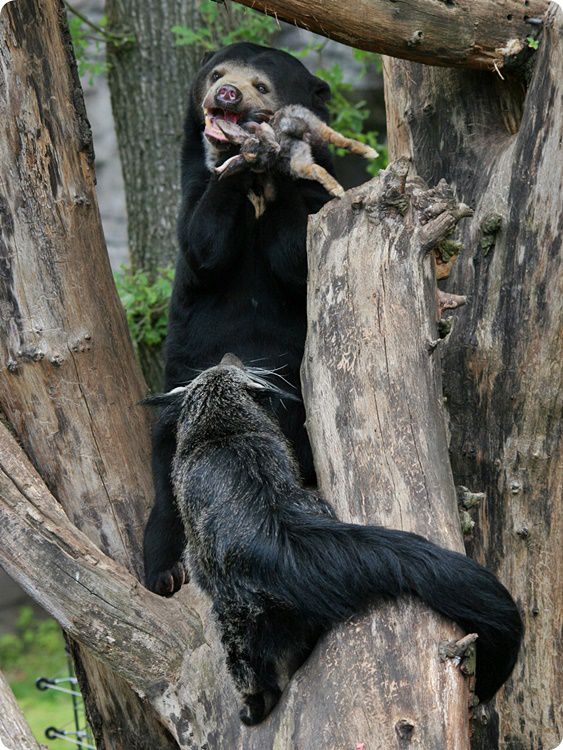
Binturong (Arctictis binturong) and Sun Bear (Helarctos malayanus)
Koninklijke Burgers’ Zoo, Arnhem, the Netherlands
Photos © Krisztián Svábik and Eelke Denekamp
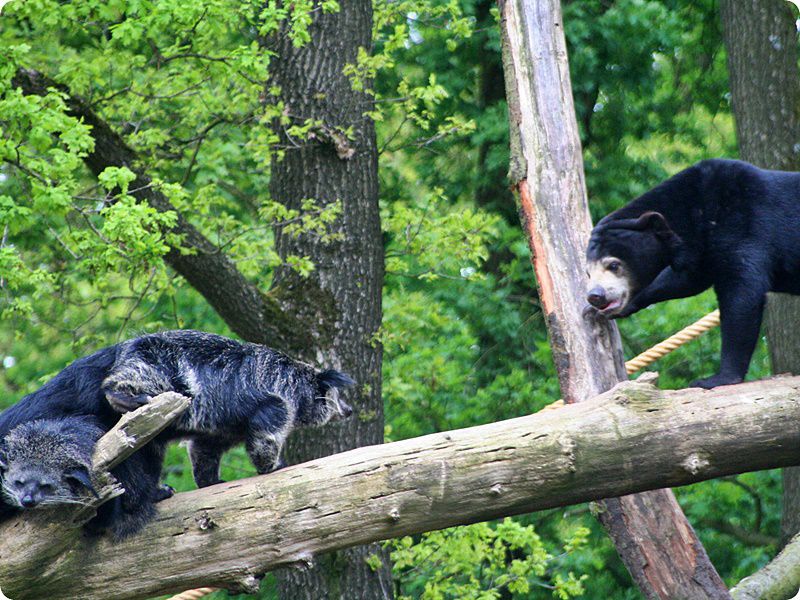
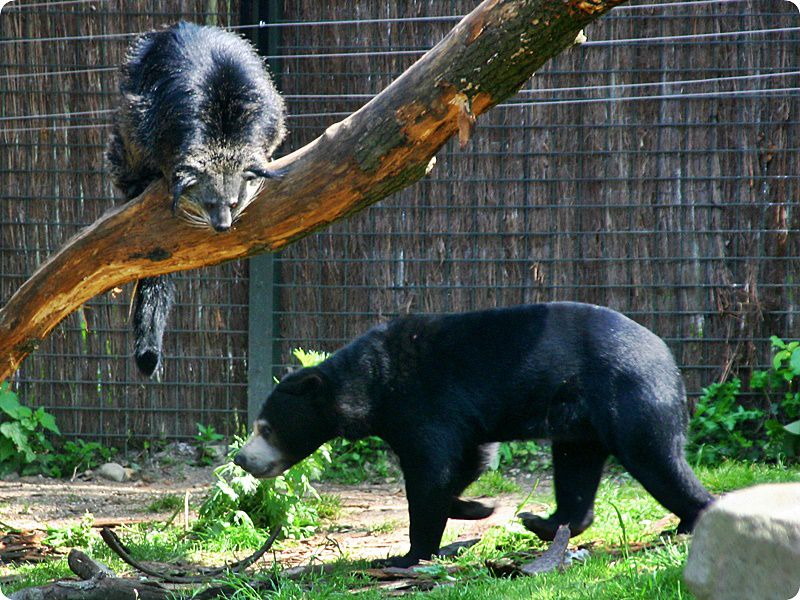
Binturong (Arctictis binturong) and Sun Bear (Helarctos malayanus)
Koninklijke Burgers’ Zoo, Arnhem, the Netherlands
Photos © Christiaan Luttenberg and Jan Vermeer
.jpg)
Binturongs (Arctictis binturong) and Sun Bears (Helarctos malayanus)
Koninklijke Burgers’ Zoo, Arnhem, the Netherlands
Photo © Theo Kruse
Combined species:
- Binturong, Arctictis binturong
- Asian Small-clawed Otter, Aonyx cinereus
Institution(s): Zoologická zahrada hl. m. Prahy (Czech Republic), Zoologická zahrada Ostrava (Czech Republic), Hamerton Zoo Park (Huntingdon, United Kingdom), Colchester Zoo (United Kingdom), Longleat (Warminster, United Kingdom), Zoo Vivarium Darmstadt (Germany), Zoo Heidelberg (Germany), Zoo de Lille (France), Parco Faunistico La Torbiera (Agrate Conturbia, Italy), ZooParc Overloon (the Netherlands), Singapore Zoo - Wildlife Reserves Singapore (Singapore), Night Safari - Wildlife Reserves Singapore (Singapore), Khao Kheow Open Zoo (Si Racha, Thailand), Melbourne Zoo (Victoria, Australia), Loveland Living Planet Aquarium (Draper, Utah, United States of America)
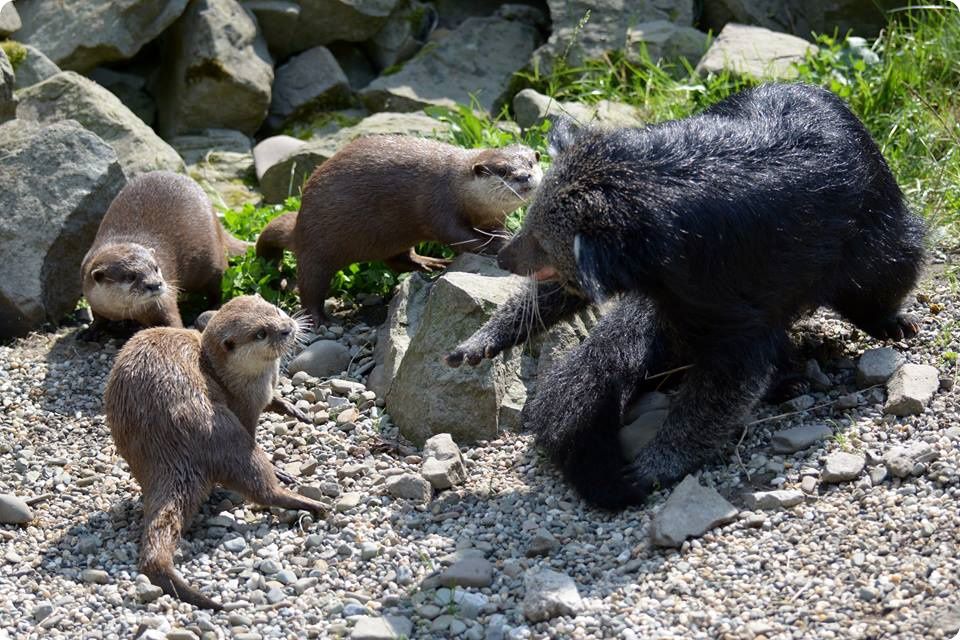
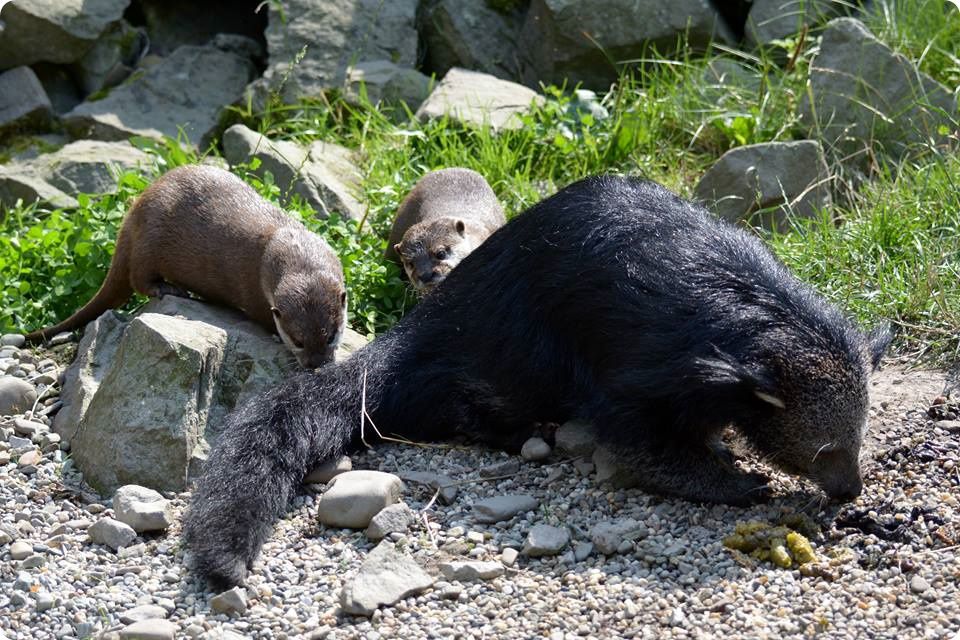
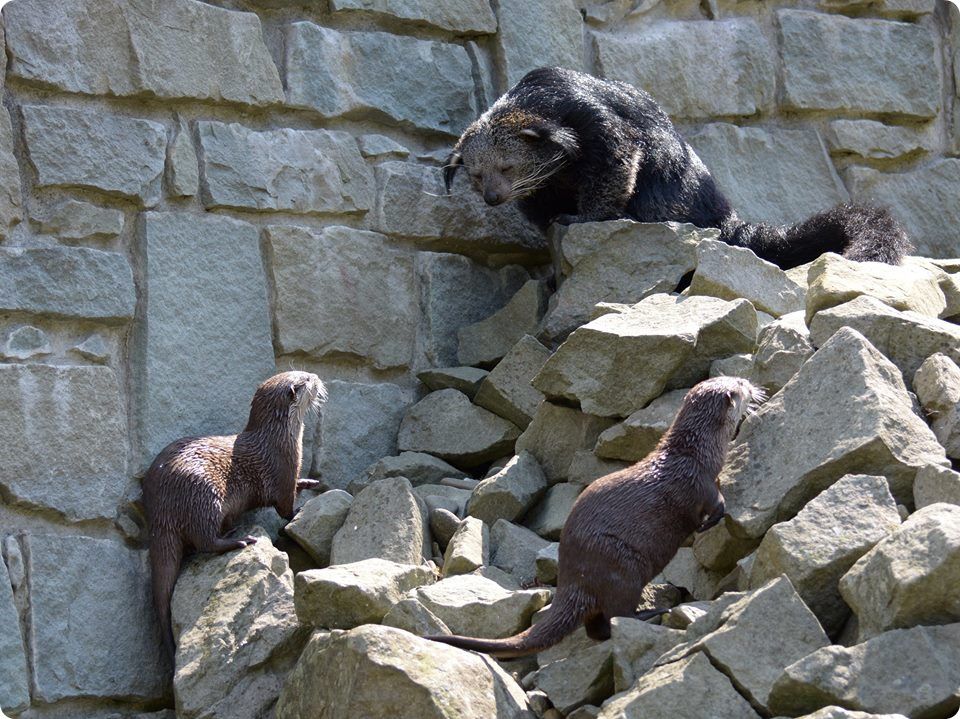
Binturong (Arctictis binturong) and Asian Small-clawed Otters (Aonyx cinereus)
Zoologická zahrada Ostrava, Czech Republic
Photo © Tamás Boros
Binturongs (Arctictis binturong) and Asian Small-clawed Otters (Aonyx cinereus)
Zoologická zahrada Ostrava, Czech Republic
Photo © Krisztián Svábik
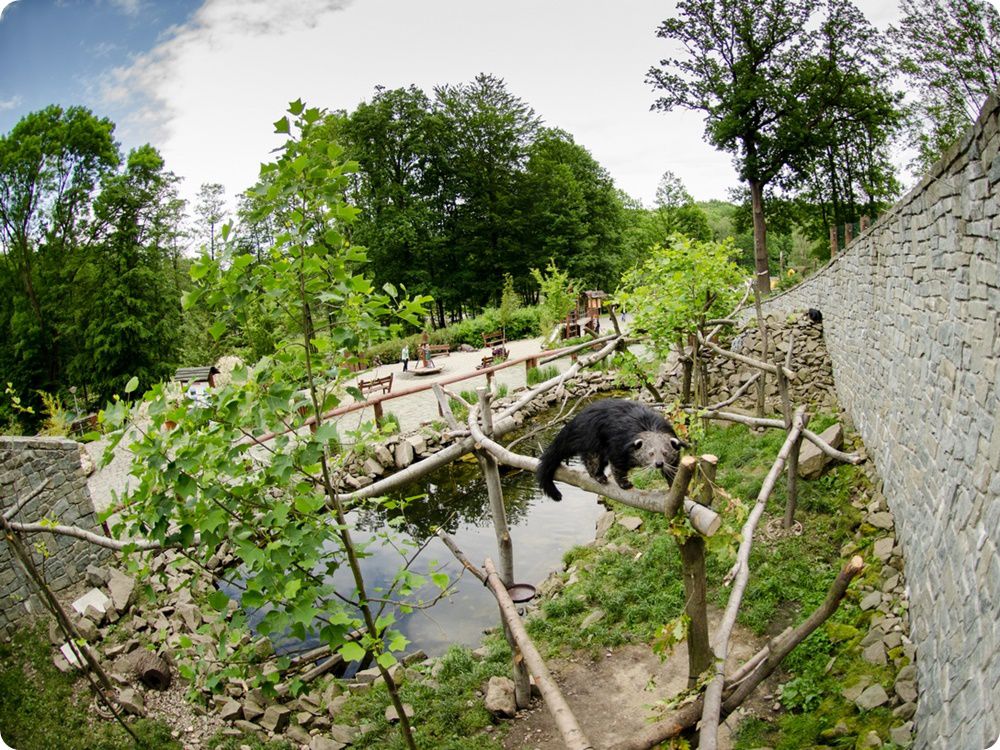
Binturong (Arctictis binturong) and Asian Small-clawed Otter (Aonyx cinereus) mixed exhibit
Zoologická zahrada Ostrava, Czech Republic
Photo © Pavel Vlček
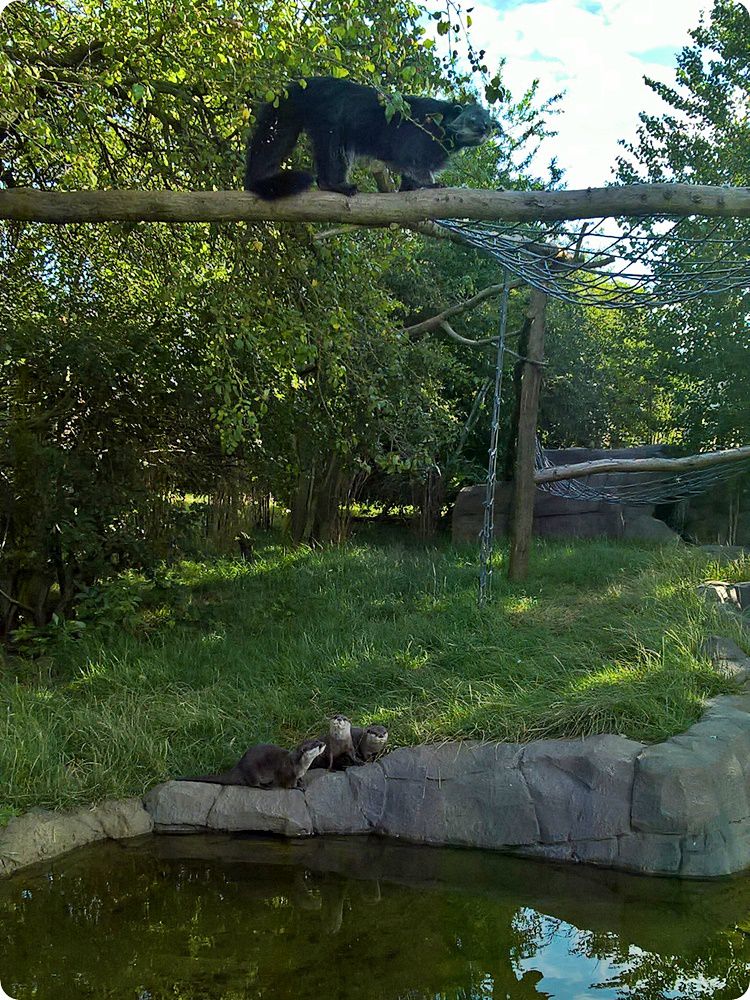
Binturong (Arctictis binturong) and Asian Small-clawed Otters (Aonyx cinereus)
Hamerton Zoo Park, Huntingdon, United Kingdom
Photo © Amy Beardmore
Combined species:
- Binturong, Arctictis binturong
- Smooth-coated Otter, Lutrogale perspicillata
Intézmény(ek): Zoologická zahrada hl. m. Prahy (Czech Republic)
Combined species:
- Binturong, Arctictis binturong
- Asian Small-clawed Otter, Aonyx cinereus
- Prevost’s Squirrel, Callosciurus prevostii
Institution(s): Brookfield Zoo (Illinois, United States of America)
Combined species:
- Binturong, Arctictis binturong
- Asian Small-clawed Otter, Aonyx cinereus
- Reeves’ Muntjac, Muntiacus reevesi
Institution(s): AquaZoo Friesland (Leeuwarden, the Netherlands)
Combined species:
- Binturong, Arctictis binturong
- Asian Small-clawed Otter, Aonyx cinereus
- Common Water Monitor, Varanus salvator
Institution(s): Singapore Zoo - Wildlife Reserves Singapore (Singapore)
Combined species:
- Binturong, Arctictis binturong
- Malay Tapir, Tapirus indicus
Institution(s): Minnesota Zoo (Minnesota, United States of America)
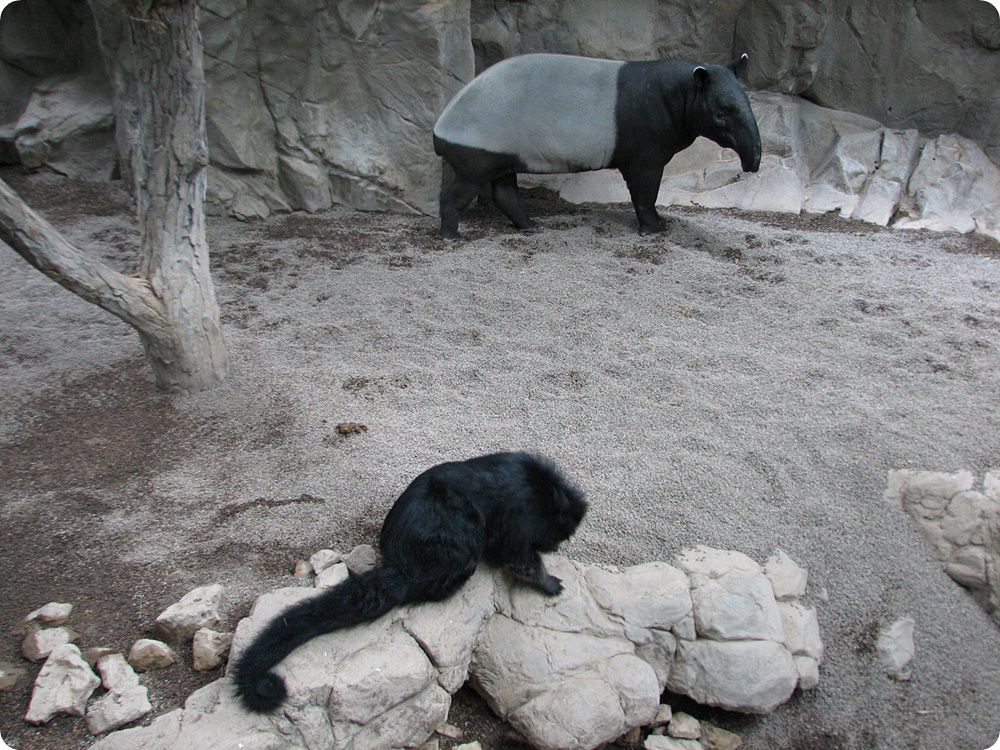
Binturong (Arctictis binturong) and Malay Tapir (Tapirus indicus)
Minnesota Zoo, Minnesota, United States of America
Photo © David Freely
Combined species:
- Binturong, Arctictis binturong
- Malay Tapir, Tapirus indicus
- Reeves’ Muntjac, Muntiacus reevesi
- several bird species: at moment Radjah Shelduck, Tadorna radjah and Magpie Goose, Anseranas semipalmata; beforehand Great White Palican, Pelecanus onocrotalus, Greta Cormorant, Phalacrocorax carbo, Little Pied Cormorant, Microcarbo melanoleucos, Fulvous Whistling-duck, Dendrocygna bicolor, White-faced Whistling-duck, Dendrocygna viduata and Meller’s Duck, Anas melleri
Institution(s): Bioparc Fuengirola (Spain)
Combined species:
- Binturong, Arctictis binturong
- Reeves’ Muntjac, Muntiacus reevesi
Institution(s): Parco Faunistico La Torbiera (Agrate Conturbia, Italy)
Combined species:
- Binturong, Arctictis binturong
- Tufted Deer, Elaphodus cephalophus
unknown institution
Combined species:
- Binturong, Arctictis binturong
- Blue Sheep, Pseudois nayaur
Institution(s): Pairi Daiza (Brugelette, Belgium)
Combined species:
- Binturong, Arctictis binturong
- Asian butterflies
unknown institution
 Small-toothed Palm Civet, Arctogalidia trivirgata
Small-toothed Palm Civet, Arctogalidia trivirgata
Combined species:
- Small-toothed Palm Civet, Arctogalidia trivirgata stigmaticus
- Malay Civet, Viverra tangalunga
Institution(s): Night Safari - Wildlife Reserves Singapore (Singapore)
Combined species:
- Small-toothed Palm Civet, Arctogalidia trivirgata
- Common Palm Civet, Paradoxurus hermaphroditus
Institution(s): Medan Zoo (Sumatra, Indonesia)
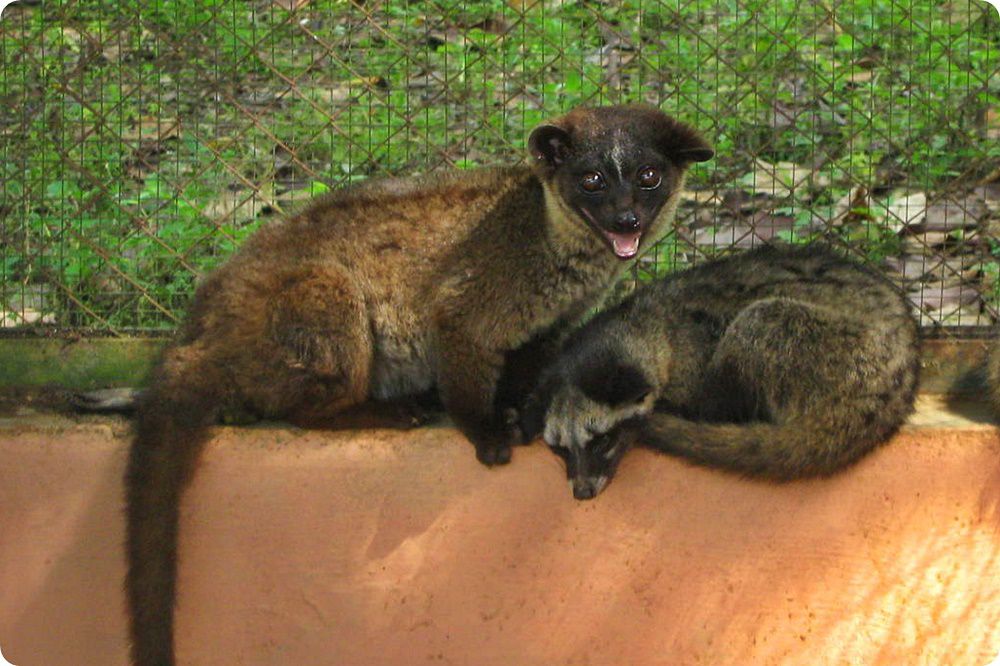
Small-toothed Palm Civet (Arctogalidia trivirgata) and Common Palm Civet (Paradoxurus hermaphroditus)
Medan Zoo, Sumatra, Indonesia
Photo © Israel Didham
 Common Palm Civet, Paradoxurus hermaphroditus
Common Palm Civet, Paradoxurus hermaphroditus
Combined species:
- Common Palm Civet, Paradoxurus hermaphroditus
- Small-toothed Palm Civet, Arctogalidia trivirgata
Institution(s): Medan Zoo (Sumatra, Indonesia)
Combined species:
- Common Palm Civet, Paradoxurus hermaphroditus
- Binturong, Arctictis binturong
- Leopard Cat, Prionailurus bengalensis
- Malayan Porcupine, Hystrix brachyura
- Asiatic Brush-tailed Porcupine, Atherurus macrourus
- Indian Muntjac, Muntiacus muntjak
Institution(s): Zoo Taiping & Night Safari (Malaysia)
Combined species:
- Common Palm Civet, Paradoxurus hermaphroditus
- Binturong, Arctictis binturong
- Asian Small-clawed Otter, Aonyx cinereus
Institution(s): Wild Zoological Park (Bobbington, United Kingdom)
Combined species:
- Common Palm Civet, Paradoxurus hermaphroditus
- Large-toothed Ferret Badger, Melogale personata
Institution(s): Yadanabon Zoological Gardens (Mandalay, Myanmar)
 Masked Palm Civet, Paguma larvata
Masked Palm Civet, Paguma larvata
Combined species:
- Masked Palm Civet, Paguma larvata
- Malayan Porcupine, Hystrix brachyura
Institution(s): Ueno Zoo (Tokyo, Japan)
Combined species:
- Masked Palm Civet, Paguma larvata
- Binturong, Arctictis binturong
- Greater Hog Badger, Arctonyx collaris
Institution(s): Shanghai Zoo (China)
Combined species:
- Masked Palm Civet, Paguma larvata
- Asiatic Black Bear, Ursus thibetanus japonicus
Institution(s): Ueno Zoo (Tokyo, Japan)
Combined species:
- Masked Palm Civet, Paguma larvata
- Northern Raccoon, Procyon lotor
- Skunks, Mephitidae
- Greater Hog Badger, Arctonyx collaris
Institution(s): Shanghai Zoo (China)
 Owston’s Palm Civet, Chrotogale owstoni
Owston’s Palm Civet, Chrotogale owstoni
Combined species:
- Owston’s Palm Civet, Chrotogale owstoni
- Prevost’s Squirrel, Callosciurus prevostii
Institution(s): Newquay Zoo (United Kingdom)
Combined species:
- Owston’s Palm Civet, Chrotogale owstoni
- Northern Threeshrew, Tupaia belangeri
- Prevost’s Squirrel, Callosciurus prevostii
Institution(s): Newquay Zoo (United Kingdom)
Combined species:
- Owston’s Palm Civet, Chrotogale owstoni
- Tortoise
unknown institution
 Malay Civet, Viverra tangalunga
Malay Civet, Viverra tangalunga
Combined species:
- Malay Civet, Viverra tangalunga
- White-handed Gibbon, Hylobates lar
Institution(s): Diergaarde Blijdorp (Rotterdam, the Netherlands)
Malay Civet (Viverra tangalunga) and Lar Gibbon (Hylobates lar)
Diergaarde Blijdorp, Rotterdam, the Netherlands
Photo © Ben Gilbert
Combined species:
- Malay Civet, Viverra tangalunga
- Masked Palm Civet, Arctogalidia trivirgata stigmaticus
Institution(s): Night Safari (Singapore)
 Common Genet, Genetta genetta
Common Genet, Genetta genetta
Combined species:
- Common Genet, Genetta genetta
- Western Lowland Gorilla, Gorilla gorilla gorilla
Institution(s): Zoo Heidelberg (Germany)
Combined species:
- Common Genet, Genetta genetta
- Central African Large-spotted Genet, Genetta maculata
Institution(s): Tierpark Gotha (Germany)
 Cape Genet, Genetta tigrina
Cape Genet, Genetta tigrina
Combined species:
- Cape Genet, Genetta tigrina
- African Brush-tailed Porcupine, Atherurus africanus
Institution(s): ZOO Antwerpen (Belgium)
Combined species:
- Cape Genet, Genetta tigrina
- Central African Large-spotted Genet, Genetta maculata
Institution(s): Tierpark Gotha (Germany)
 Central African Large-spotted Genet, Genetta maculata
Central African Large-spotted Genet, Genetta maculata
Combined species:
- Central African Large-spotted Genet, Genetta maculata
- Common Genet, Genetta genetta
Institution(s): Tierpark Gotha (Germany)
Combined species:
- Central African Large-spotted Genet, Genetta maculata
- Cape Genet, Genetta tigrina
Institution(s): Tierpark Gotha (Germany)
SUMMARIZE THE EXPERIENCES
This document purposefully focuses on creating a list of mixed-species exhibits with family Viverridae, for further and detailed information it is worth contacting the institutions mentioned above. Only a short summary of the general experiences is given here. Many of the listed coexistences are still ongoing at present; many of them are not anymore.
As it can be seen from the abovementioned lists the Binturong is the most common species coexist with other species in a mixed exhibit.
In San Diego Zoo there were a successful mixed exhibit with Binturongs and Lion-tailed Macaque since the end of the 1980s. The species were separated during feeding time, rearing of young and over night. Binturongs were then given access to the transfer chutes over which there was raincover and heat lamps. The viverrids have also had access to the exhibit at night. When a female Binturong was due to give birth, the institution separated her from the group into a room with rainshelter and a nest box. She was separated from approx. one week before the date, until her pups were large and strong enough to climb on their own sufficiently and defend themselves from the macaques which was around seven months of age of the young Binturongs. Animals could retreat from each other on climbing structures, wide open space and under tall grasses. Size of the area was nearly 500 m² (HAMMER 2002).
An other institution had negative experience with a Binturong and primates combination: the mixed exhibit had to be given up because the male Binturong had been too aggressive against the Dusky Langurs (HAMMER 2002).
Rodrigues Fruit Bats were removed from a Binturong exhibit after several were injured by the Binturongs over a long period; in this case, the Binturongs were not believed to be hunting the bats (BURKE, M. pers. comm. In: AZA Small Carnivore TAG 2010. Viverrids (Viverridae) Care Manual. Association of Zoos and Aquariums, Silver Spring, MD.p.107.).
At Espace Zoologique de Saint-Martin-la-Plaine the Binturong and Sun Bear coexistence was not planned: at first one Binturong found a way to get into the neighbouring bear enclosure and was used afterwards to feed together with them without any aggression (HAMMER 2002). Afterwards a female Sun Bear was born there and it has lived with Binturongs since its birth date. Later on the institution received a male bear and the introduction with the Binturongs was not a problem, although the male bear was separated during the night because it was a little aggressive during feeding. There were two connected outdoor enclosures and all the animals were fed together outside without problem. The size of the area is around 500 m². One lethal accident was also reported. A newly arrived male Binturong was really bad-tempered and was moaning a lot against the other Binturongs and bears. One day it was in the indoor enclosure with the male bear where a fight started resulted in a bear has killed and partially eaten the Binturong (GERARD 2012, pers. comm.).
In Arnhem Binturongs are still living together with Sun Bears in the Burgers’ Rimba exhibit which cohabitation is going well. The two species were first introduced to each other in 2009. The colleagues thought that the bears would chase after the Binturongs and dominate them but that was not the case. The Binturongs arrived from the abovementioned French institution so have had previous experiences with the presence of the bears. The viverrids are also dominant during feeding therefore the main food is fed separately in the indoor enclosures to prevent competititon. The rest of the food is scattered in the outdoor enclosure – which is around 1300 m² – also for enrichment. The bears are together with the Binturongs in the outdoor enclosure and sometimes in the indoor enclosure visible for the public. During the night the Binturongs are in their own pens. The male bear is separated from the females and has two night pens to himself. The female bears have the opportunity to go in all the other inside enclosures including enclosure visible for public and breeding pens. Since some time the colleagues noticed wounds on the base of the tails of the Binturongs. According to the veterinarian this is probably caused by the bears. The keepers think the bears bite them as the Binturongs go into their night enclosure when their tale sticks out (VAN de PUT 2012, pers. comm.).
The most frequent association is the Binturong & Asian Small-clawed Otter coexistence which have been tried in many institutions. In Parco Faunistico La Torbiera a pair of Binturong lived together with an otter family in a 1600 m² size exhibit. As the viverrids were being molested by the otters the exhibit was not suitable for breeding the Binturongs so it had to be given up (ROCCA 2018, pers. comm.). In Zoo Ostrava each species occupies a different niche in the exhibit: the otters on the ground with a large pool and waterfall, and the Binturongs above the otters in the trees, branches and platforms for resting. Their relationship is also without any major problems: otters are very curious of course and Binturongs have learnt that it is better for them to stay up on the perches. It is important to install the upper part for Binturongs high enough, so that otters can not reach them and also can not climb up the trees (which they can if not too high and the access is possible). The access to their indoor enclosures is also separate for both species, in lower level for the otters and higher for the Binturongs (OBRAČAJOVÁ 2018, pers. comm.). In Zoo Heidelberg the Binturong and otter combination works also well. According to the experiences the otters climb really well and they are dominant over the viverrids, so the keepers have to feed them separately (REICHLER-DANIELOWSKI 2018, pers. comm.). In Hamerton Zoo Park the same combination has gone successful in that the individuals live well together, however, its very very rare that the Binturongs and otters are seen sharing the same space (BEARDMORE 2018, pers. comm.).
Colchester Zoo had a mix of Asian Small-clawed Otter, two species of langur and Binturong together. Otters and langurs were largely successful, however, the keepers found the langurs eating the faeces of the Binturong and they became infected with Salmonella and the two elderly langurs both died despite treatment. Therefore the institution has not maintained any primate with the Binturong and otters (BARWICK 2018, pers. comm.)
In Singapore Zoo Binturongs lived together not just with Asian Small-clawed Otters, but subadult Common Water Monitors have also been integrated into the mixed exhibit. After the lizards have reached a certain length were removed from the exhibit.
In Bioparc Fuengirola a Binturong family lives in a mixed exhibit with Malayan Tapirs, Chinese Muntjacs and several species of waterfowl. The enclosure has a large artificial rock outcrop and a couple of trees where the Bingturongs spend most of the time, so there is no much conflict. Sometimes when they go down to the ground, they are not causing any problem. Just the female bingturong – when is pregnant – changes her temper and become very aggressive towards the male, the keepers, the muntjacs and she had killed some waterfowl. This is the signal to move her alone to a separate holding till she had her litter and when the cubs are three months old, the institution can introduce the female and cubs again to the exhibit and she is again calm and vegetarian (RECUERO 2018, pers. comm.).
The Minnesota Zoological Gardens have also successfully housed their Binturongs and Malayan Tapir together for many years. The institution ended this co-habitation a year ago, only because the Binturongs were not very visible to their guests in the Tapir habitat. The colleagues never observed any negative interactions between the two species (NESS 2018, pers. comm).
In Parco Faunistico La Torbiera a Binturong and Reeves’ Muntjac coexistence was established. As the presence of the viverrids could be a problem for the muntjac fawn the instituton keeps only a female group of the deer (ROCCA 2018, pers. comm.).
Furthermore, Binturongs have been successfully exhibited with Tufted Deer, Asian butterflies and Lion-tailed Macaques (GREEN 2001), as well as with Asian Small-clawed Otters, Prevost’s Squirrels and Giant Asian Squirrels (BURKE, M. pers. comm.) (In: AZA Small Carnivore TAG 2010. Viverrids (Viverridae) Care Manual. Association of Zoos and Aquariums, Silver Spring, MD.p.107.).
Owston’s Palm Civets have been exhibited with tortoise. This combination went well, but the tortoise needed to be fed in a different location to keep the OCs from eating their food (ROBERTON et al. 2002 In: AZA Small Carnivore TAG 2010. Viverrids (Viverridae) Care Manual. Association of Zoos and Aquariums, Silver Spring, MD.p.107.).
The Common Genet and Western Lowland Gorilla coexistence worked without problem in regarding behaviour in Zoo Heidelberg. As the Genets were too small and climbed too often they found a way out of the enclosure so this combination is no longer exist (REICHLER-DANIELOWSKI 2018, pers. comm.).
ACKNOWLEDGEMENTS
I would like to thank all the persons very much who helped to improve this short summary with providing information and photographs as well, in particulare:
Clive BARWICK curator (Colchester Zoo, United Kingdom), Amy BEARDMORE zookeeper (Hamerton Zoo Park, Huntingdon, United Kingdom), Dr. Jean-Christophe GERARD veterinarian (Espace Zoologique de Saint-Martin-la-Plaine, France), Tom NESS, AZA Population biologist & curator (Minnesota Zoological Gardens, Minnesota, United States of America), Adéla OBRAČAJOVÁ curator (Zoologická zahrada Ostrava, Czech Republic), Jana PLUHÁČKOVÁ curator (Zoologická zahrada Ostrava, Czech Republic), Kim van de PUT assistant curator (Koninklijke Burgers’ Zoo, Arnhem, the Netherlands), Jesus RECUERO veterinarian & curator (Bioparc Fuengirola, Spain), Sandra REICHLER-DANIELOWSKI curator (Zoo Heidelberg, Germany), Francesco ROCCA (Parco Faunistico La Torbiera, Agrate Conturbia, Italy), Owen TAYLOR head keeper (Paignton Zoo Environmental Park, United Kingdom)
As well as I would like to thank all the persons very much who helped to improve this document with providing further photographs, their names are lsited below:
Tamás BOROS, Eelke DENEKAMP, Israel DIDHAM, Bernard DUPONT, David FREELY, Ben GILBERT, Theo KRUSE, Jonas LIVET, Christiaan LUTTENBERG, Kalyan VARMA, Jan VERMEER
References
AZA Small Carnivore TAG 2010. Viverrids (Viverridae) Care Manual. Association of Zoos and Aquariums, Silver Spring, MD.p.107.
GREEN, S. 2001. North American Regional Studbook Binturong (Arctictis binturong). Detroit Zoological Institute, Royal Oak, MI.
HAMMER, G. 2002. Mixed species exhibits involved mammals: stock report and problems. Dissertation. Naturwissenschaftliche Fakultät Universität Salzburg.
ROBERTON, S., ROSENTHAL, S. & MUIR, S. 2002. Management Guidelines for Owston’s civet, Chrotogale owstoni (Thomas 1912). EAZA SCTAG and The Owston’s civet conservation project, Cuc Phuong National Park, Viet Nam. (Draft copy).
THOMAS, W. D. & MARUSKA, E. J. 1996. Mixed-species Exhibits with Mammals. In: Kleiman, D. G., Allen, M. E., Thompson, K. V. & Lumpkin, S. (eds) 1996. Wild Mammals in Captivity: Principles and Techniques. Chicago and London: The University of Chicago Press. Pp. 204-211.
www.zoochat.com
Comments

